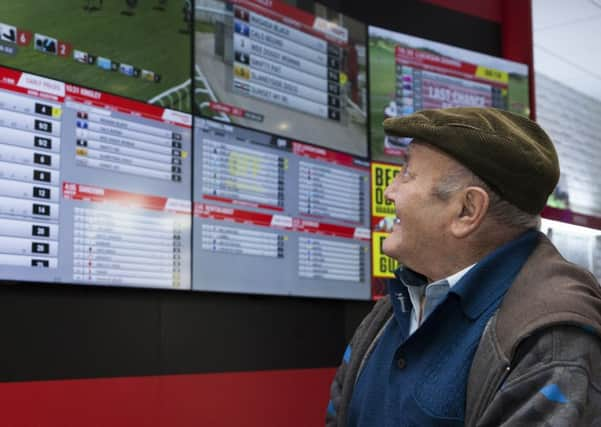Bookmakers won't gamble with Scots who need help with a problem


However, a small number of people get into difficulty, with serious consequences for them, their family and friends.
The encouraging news from the 2015 Scottish Health Survey, published last month, is that despite an increase in gambling activity in Scotland, the number of problem gamblers is actually falling. The study found that 0.7 per cent of those surveyed identified as problem gamblers, down from 0.8 per cent the previous year and lower than in 2012. To put those figures into some context, the same survey found that 26 per cent of the population drank hazardous or harmful levels of alcohol and 29 per cent of respondents were obese. Sadly, Scotland has one of the worst obesity records among Organisation for Economic Co-operation and Development countries. By contrast, problem gambling in Scotland is low by international standards.
Advertisement
Hide AdAdvertisement
Hide AdAs an industry committed to responsible gambling, the results of the 2015 Scottish Health Survey give us cause for optimism. But you won’t find any complacency among our members. One problem gambler is one too many.
With alcohol-free shops, Think 21 age verification policies and professional staff trained to identify problem signs, betting shops have long been among the safest places in Scotland to gamble responsibly.
In recent years, the betting industry has stepped up its activity, launching a raft of responsible gambling measures including Gamble Aware Week, new alerts on gaming machines, restrictions on advertising and a nationwide multi-operator self exclusion scheme, piloted in Glasgow and rolled out across the UK earlier this year.
We’re also working on the ground with charities like Paisley-based RCA Trust, who provided drop-in sessions in Glasgow and Paisley during Gamble Aware Week. RCA Trust has been at the forefront of efforts to support those who get into difficulty for decades. Thanks to their efforts, and countless charities and support services like them up and down the country, there is free and confidential advice for those who need it.
One of the most exciting areas of progress is the industry’s use of technology to promote responsible gambling. In 2014, a landmark study by the Responsible Gambling Trust found that it was possible to distinguish between problem and non-problem gambling behaviour on machines.
It was followed a year later by the roll-out of world leading technology – known as Player Awareness Systems (PAS) – that uses complex algorithms to analyse the behaviour of those playing on gaming machines when they are logged in to a customer account.
Their behaviour is then assessed against a range of markers of problem gambling and, if it appears that a customer is getting into difficulty, alerts (via text, e-mail, or on-screen) can subsequently be sent to players. Shop staff can also monitor account-based play in real time and intervene where necessary.
Our understanding – and roll-out – of PAS is still in its infancy, but it’s evidence of the industry’s direction of travel. As we continue to learn more about its potential, our members are also examining how to apply the same processes to anonymous non-account-based play, which accounts for the majority of gaming sessions. It’s a much more challenging proposition, but the will is there.
Advertisement
Hide AdAdvertisement
Hide AdAs far as responsible gambling is concerned, this is an industry that refuses to stand still. For example, several of our members are supporting a project that uses eye tracking technology to explore how people use gaming machines and how they respond to responsible gambling messages.
And later this year, the ABB will publish its third responsible gambling code.
In effect, the code is a binding contract with our members, a sign of our – and their – commitment to ensure Scotland continues to gamble responsibly. It will build on the work already undertaken, with new measures to better identify customers at risk; again, using the technology at our disposal to support our responsible gambling objectives.
There is clearly more work to do, but the latest Scottish Health Survey results give us confidence that we’re on the right track. We’re determined to do more to support the small number of people who get into difficulty. Technology could well hold the key.
For advice on problem gambling call the National Gambling Helpline on 0808 8020 133 or visit gambleaware.co.uk. Donald Morrison is director of ABB Scotland, the trade association for high street bookmakers in Scotland, www.abb.uk.com